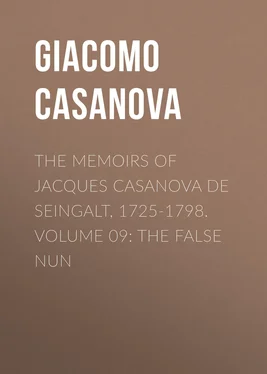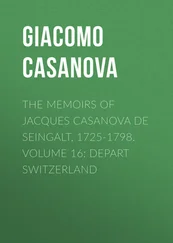Giacomo Casanova - The Memoirs of Jacques Casanova de Seingalt, 1725-1798. Volume 09 - the False Nun
Здесь есть возможность читать онлайн «Giacomo Casanova - The Memoirs of Jacques Casanova de Seingalt, 1725-1798. Volume 09 - the False Nun» — ознакомительный отрывок электронной книги совершенно бесплатно, а после прочтения отрывка купить полную версию. В некоторых случаях можно слушать аудио, скачать через торрент в формате fb2 и присутствует краткое содержание. Жанр: Биографии и Мемуары, История, foreign_edu, foreign_antique, foreign_prose, на английском языке. Описание произведения, (предисловие) а так же отзывы посетителей доступны на портале библиотеки ЛибКат.
- Название:The Memoirs of Jacques Casanova de Seingalt, 1725-1798. Volume 09: the False Nun
- Автор:
- Жанр:
- Год:неизвестен
- ISBN:нет данных
- Рейтинг книги:5 / 5. Голосов: 1
-
Избранное:Добавить в избранное
- Отзывы:
-
Ваша оценка:
- 100
- 1
- 2
- 3
- 4
- 5
The Memoirs of Jacques Casanova de Seingalt, 1725-1798. Volume 09: the False Nun: краткое содержание, описание и аннотация
Предлагаем к чтению аннотацию, описание, краткое содержание или предисловие (зависит от того, что написал сам автор книги «The Memoirs of Jacques Casanova de Seingalt, 1725-1798. Volume 09: the False Nun»). Если вы не нашли необходимую информацию о книге — напишите в комментариях, мы постараемся отыскать её.
The Memoirs of Jacques Casanova de Seingalt, 1725-1798. Volume 09: the False Nun — читать онлайн ознакомительный отрывок
Ниже представлен текст книги, разбитый по страницам. Система сохранения места последней прочитанной страницы, позволяет с удобством читать онлайн бесплатно книгу «The Memoirs of Jacques Casanova de Seingalt, 1725-1798. Volume 09: the False Nun», без необходимости каждый раз заново искать на чём Вы остановились. Поставьте закладку, и сможете в любой момент перейти на страницу, на которой закончили чтение.
Интервал:
Закладка:
Foreseeing that we would, a little later, be all of us in each other's way, I begged M– M– to arrange everything so that we could be apart, and she contrived it marvellously well.
After supper, the ambassador proposed a game of faro, which our beauties did not know; he called for cards, and placed one hundred Louis on the table before him; he dealt, and took care to make C– C– win the whole of that sum. It was the best way to make her accept it as pin-money. The young girl, dazzled by so much gold, and not knowing what to do with it, asked her friend to take care of it for her until such time as she should leave the convent to get married.
When the game was over, M– M– complained of a headache, and said that she would go to bed in the alcove: she asked me to come and lull her to sleep. We thus left the new lovers free to be as gay as they chose. Six hours afterwards, when the alarum warned us that it was time to part, we found them asleep in each other's embrace. I had myself passed an amorous and quiet night, pleased with M– M–, and with out giving one thought to C– C–.
CHAPTER XXII
M. De Bernis Goes Away Leaving Me the Use of His Casino—His Good Advice: How I Follow It—Peril of M. M. and Myself—Mr. Murray, the English Ambassador—Sale of the Casino and End of Our Meetings—Serious Illness of M. M.—Zorzi and Condulmer—Tonnie
Though the infidelities of C– C– made me look at her with other eyes than before, and I had now no intention of making her the companion of my life, I could not help feeling that it had rested with me to stop her on the brink of the stream, and I therefore considered it my duty always to be her friend.
If I had been more logical, the resolution I took with respect to her would doubtless have been of another kind. I should have said to myself: After seducing her, I myself have set the example of infidelity; I have bidden her to follow blindly the advice of her friend, although I knew that the advice and the example of M–M– would end in her ruin; I had insulted, in the most grievous manner, the delicacy of my mistress, and that before her very eyes, and after all this how could I ask a weak woman to do what a man, priding himself on his strength, would shrink from at tempting? I should have stood self-condemned, and have felt that it was my duty to remain the same to her, but flattering myself that I was overcoming mere prejudices, I was in fact that most degraded of slaves, he who uses his strength to crush the weak.
The day after Shrove Tuesday, going to the casino of Muran, I found there a letter from M– M–, who gave me two pieces of bad news: that C– C– had lost her mother, and that the poor girl was in despair; and that the lay-sister, whose rheum was cured, had returned to take her place. Thus C– C– was deprived of her friend at a time when she would have given her consolation, of which she stood in great need. C– C–, it seemed, had gone to share the rooms of her aunt, who, being very fond of her, had obtained permission from the superior. This circumstance would prevent the ambassador taking any more suppers with her, and I should have been delighted if chance had put this obstacle in his path a few days sooner.
All these misfortunes seemed of small account com pared with what I was afraid of, for C– C– might have to pay the price for her pleasures, and I so far regarded myself as the origin of her unhappiness as to feel bound never to abandon her, and this might have involved me in terrible complications.
M– M– asked me to sup with her and her lover on the following Monday. I went and found them both sad—he for the loss of his new mistress, and she because she had no longer a friend to make the seclusion of the convent pleasant.
About midnight M. de Bemis left us, saying in a melancholy manner that he feared he should be obliged to pass several months in Vienna on important diplomatic business. Before parting we agreed to sup together every Friday.
When we were alone M– M– told me that the ambassador would be obliged to me if in the future I would come to the casino two hours later. I understood that the good-natured and witty profligate had a very natural prejudice against indulging his amorous feelings except when he was certain of being alone.
M. de Bemis came to all our suppers till he left for Vienna, and always went away at midnight. He no longer made use of his hiding-place, partly because we now only lay in the recess, and partly because, having had time to make love before my arrival, his desires were appeased. M– M– always found me amorous. My love, indeed, was even hotter than it had been, since, only seeing her once a week and remaining faithful to her, I had always an abundant harvest to gather in. C– C–'s letters which she brought to me softened me to tears, for she said that after the loss of her mother she could not count upon the friendship of any of her relations. She called me her sole friend, her only protector, and in speaking of her grief in not being able to see me any more whilst she remained in the convent, she begged me to remain faithful to her dear friend.
On Good Friday, when I got to the casino, I found the lovers over-whelmed with grief. Supper was served, but the ambassador, downcast and absent, neither ate nor spoke; and M– M– was like a statue that moves at intervals by some mechanism. Good sense and ordinary politeness prevented me from asking any questions, but on M– M– leaving us together, M. de Bemis told me that she was distressed, and with reason, since he was obliged to set out for Vienna fifteen days after Easter. "I may tell you confidentially," he added, "that I believe I shall scarcely be able to return, but she must not be told, as she would be in despair." M– M– came back in a few minutes, but it was easy to see that she had been weeping.
After some commonplace conversation, M. de Bernis, seeing M– M– still low-spirited, said,
"Do not grieve thus, sweetheart, go I must, but my return is a matter of equal certainty when I have finished the important business which summons me to Vienna. You will still have the casino, but, dearest, both friendship and prudence make me advise you not to come here in my absence, for after I have left Venice I cannot depend upon the faith of the gondoliers in my service, and I suspect our friend here cannot flatter himself on his ability to get reliable ones. I may also tell you that I have strong reasons for suspecting that our intercourse is known to the State Inquisitors, who conceal their knowledge for political reasons, but I fancy the secret would soon come to light when I am no longer here, and when the nun who connives at your departure from the convent knows that it is no longer for me that you leave it. The only people whom I would trust are the housekeeper and his wife. I shall order them, before I go, to look upon our friend here as myself, and you can make your arrangements with them. I trust all will go well till my return, if you will only behave discreetly. I will write to you under cover of the housekeeper, his wife will give you my letters as before, and in the same way you may reply. I must needs go, dearest one, but my heart is with you, and I leave you, till my return, in the hands of a friend, whom I rejoice to have known. He loves you, he has a heart and knowledge of the world, and he will not let you make any mistakes."
M– M– was so affected by what the ambassador had said that she entreated us to let her go, as she wished to be alone and to lie down. As she went we agreed to sup together on the following Thursday.
As soon as we were alone the ambassador impressed me with the absolute necessity of concealing from her that he was going to return no more. "I am going," said he, "to work in concert with the Austrian cabinet on a treaty which will be the talk of Europe. I entreat you to write to me unreservedly, and as a friend, and if you love our common mistress, have a care for her honour, and above all have the strength of mind to resist all projects which are certain to involve you in misfortune, and which will be equally fatal to both. You know what happened to Madame de Riva, a nun in the convent of St.–. She had to disappear after it became known that she was with child, and M. de Frulai, my predecessor, went mad, and died shortly after. J. J. Rousseau told me that he died of poison, but he is a visionary who sees the black side of everything. For my part, I believe that he died of grief at not being able to do anything for the unfortunate woman, who afterwards procured a dispensation from her vows from the Pope, and having got married is now living at Padua without any position in society.
Читать дальшеИнтервал:
Закладка:
Похожие книги на «The Memoirs of Jacques Casanova de Seingalt, 1725-1798. Volume 09: the False Nun»
Представляем Вашему вниманию похожие книги на «The Memoirs of Jacques Casanova de Seingalt, 1725-1798. Volume 09: the False Nun» списком для выбора. Мы отобрали схожую по названию и смыслу литературу в надежде предоставить читателям больше вариантов отыскать новые, интересные, ещё непрочитанные произведения.
Обсуждение, отзывы о книге «The Memoirs of Jacques Casanova de Seingalt, 1725-1798. Volume 09: the False Nun» и просто собственные мнения читателей. Оставьте ваши комментарии, напишите, что Вы думаете о произведении, его смысле или главных героях. Укажите что конкретно понравилось, а что нет, и почему Вы так считаете.












